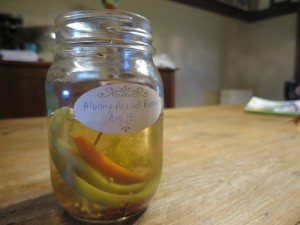I opened a jar of pickled green beans a few weeks ago and stuck in a fork. It was during that grey area between afternoon snack (“I need something to tide me over”) and pre-dinner (“Oh I shouldn’t”). The jar had arrived as part of a gift basket from editor Jen Knoch, welcoming me to ECW Press. I’m working on a non-fiction book about fruit in the city. The beans were crisp to the bite and tart with just the right wash of garlic and dill.
My daughter and I whipped through a lot of them quickly. You can justify pickles at any time of day when they are made with green beans. “It’s a vegetable, Mom.” In particular, it’s a vegetable that some kids – I’m not naming anyone in particular – usually hide under the mashed potatoes.
Days later, as the jar was near empty, we slowed down. Our consumption became more mindful. We had to think  through how we would savour those last few bites. A walking/eating event wouldn’t do, neither would stress-eating through school studies.
through how we would savour those last few bites. A walking/eating event wouldn’t do, neither would stress-eating through school studies.
It reminded me of a conversation I had with an urban fruit gleaner who reconciled his disparate views on waste in a time of abundance. He was pressing cider at a farmers market and over-poured a bottle, spilling a half litre on the ground. A customer chided him for being wasteful. He looked at the massive volume he still had and thought, “Are you kidding me?” He considered the thousands of abandoned apple trees in the countryside and his sense of scale changed again. Go ahead and rescue the fruit from one tree. You can’t get them all. It’s okay.
Nature wastes nothing. Those apples on the ground will be food for squirrels, raccoons and other creatures. What they don’t take will go to birds and insects. What’s left behind will add to some beast’s habitat and fertilize the ground into better soil to grow another tree.
But the pickles.
I can picture the effort that went into blanching, bathing, chopping, spicing and packing those beans. It would have taken an afternoon’s toil over a hot stove and steaming pots. It’s not that we were wasting the beans from the full jar, but we had given little thought to what it took to get them here. Is it wasteful to gorge when the supply is high? Or to leave the apples on the tree?
It is human nature to value what is in demand while paying no mind to what is plentiful. Consider the cost of cauliflower this year. I can’t say the brainy white vegetable has ever been a favourite. In fact, it seemed a disappointing choice at our childhood table when nothing else was available. Last month a friend ordered a plate of it, battered and fried, at a hip downtown noodle bar. When the baskets at the green grocer are overflowing again with the cruciferous vegetable, will it fall off off the menu? I added the last bean to the side of a bagel toasted with melted cheese. Complementary, while simple.
I ate slowly.
